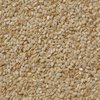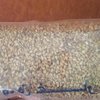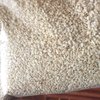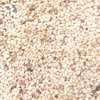Sesame, (Sesamum indicum), also called benne, erect annual plant of the family Pedaliaceae, grown since antiquity for its seeds, which are used as food and flavouring and from which a prized oil is extracted. Widely cultivated, the sesame plant is found in most of the tropical, subtropical, and southern temperate areas of the world. The aroma and taste of sesame seed are mild and nutlike. The chief constituent of the seed is its fixed oil, which usually amounts to about 44 to 60 percent. Noted for its stability, the oil resists oxidative rancidity. The seeds are also high in protein and are rich in thiamin and vitamin B6.
Sesame seeds contain 50-55 percent oil and 25 percent protein. The oil contains approximately 47 percent oleic acid and 39 percent linoleic acid. Sesame seeds are used in baking, to top breads, buns and bagels, in crackers and in cakes. The ground seeds are used in East African cuisine in soups, fish dishes. They are also used in sweets, including a dish similar to peanut brittle. Ground seeds are also used as a condiment in some Asian and Indian dishes.
Sesame oil is used in salad and cooking oils, shortening and some margarines. It is a key flavor ingredient in some Chinese dishes.. Sesame oil keeps well and resists rancidity, due to the presence of an antioxidant, sesamol.
Tahini, a traditional Mideast sesame paste is made from hulled sesame seed. The paste is rich in protein and a very good energy source. Dip and spread manufacturers use tahini in conjunction with chickpeas to produce hummus and with egg plant to produce baba ganouj. Halva production is a subset of this industry. Halva is a popular sweet made by mixing approximately 50 percent tahini with boiled and whipped sugar and several other ingredients to form a popular Middle Eastern confection.
Non-food uses for sesame oil include ingredients in soaps, paints, cosmetics, perfumes and insecticides





